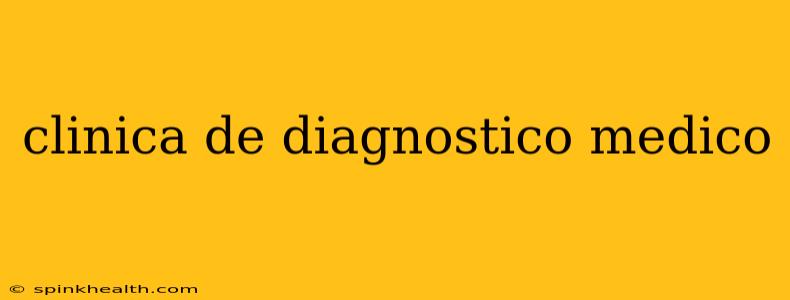Choosing the right medical diagnostic clinic can feel like navigating a maze. With so many options available, understanding the nuances of each clinic's services and capabilities is crucial for receiving accurate and timely diagnoses. This guide will illuminate the path, helping you understand what to look for and what questions to ask when selecting a medical diagnostic clinic. Our journey begins with understanding the very foundation of these essential healthcare providers.
What is a Medical Diagnostic Clinic?
A medical diagnostic clinic is a healthcare facility specializing in performing various diagnostic tests and procedures. These clinics play a vital role in the healthcare system, providing crucial information to physicians for accurate diagnoses and treatment plans. Think of them as the investigative arm of medicine, providing the evidence doctors need to solve the medical puzzle. They range from small, specialized labs focusing on a specific area like blood work, to larger facilities offering a comprehensive suite of diagnostic services.
What Types of Diagnostic Tests Are Offered?
The range of tests offered varies greatly depending on the clinic’s size and specialization. Some common diagnostic tests include:
- Blood tests: These comprehensive analyses reveal information about everything from blood cell counts to cholesterol levels and hormone balances.
- Urine tests: Analyzing urine samples helps detect infections, kidney problems, and other metabolic issues.
- Imaging tests: This encompasses a wide array of technologies, including X-rays, ultrasounds, CT scans, and MRIs, offering detailed visual representations of internal organs and structures.
- Biopsies: The removal and examination of tissue samples under a microscope for the detection of diseases like cancer.
- Genetic testing: Analyzing DNA to identify genetic predispositions to certain diseases or to diagnose genetic disorders.
The specific tests available will vary widely between clinics, so it's vital to check if they offer the specific test you require.
How Do I Choose the Right Medical Diagnostic Clinic?
Choosing the right clinic requires careful consideration. Here are some crucial factors:
- Accreditation and Licensing: Ensure the clinic is accredited by reputable organizations and holds the necessary licenses to operate legally and safely. Accreditation signifies adherence to high standards of quality and patient care.
- Reputation and Reviews: Research the clinic's reputation by checking online reviews and testimonials from previous patients. Look for consistent positive feedback regarding accuracy, efficiency, and customer service.
- Location and Accessibility: Consider the clinic's proximity to your home or workplace, and assess its accessibility for individuals with mobility limitations.
- Insurance Coverage: Check whether your health insurance plan covers diagnostic services at the chosen clinic to avoid unexpected out-of-pocket expenses.
- Turnaround Time for Results: Inquire about the expected turnaround time for test results. Faster results can be critical in certain situations.
What are the Costs Associated with Diagnostic Tests?
The cost of diagnostic tests varies significantly depending on the type of test, the clinic's location, and your insurance coverage. It's always advisable to contact the clinic directly or your insurance provider to obtain a cost estimate before undergoing any tests. Transparency in pricing is a key indicator of a reputable clinic.
How Long Does it Take to Get Diagnostic Test Results?
The time it takes to receive results depends on the complexity of the test and the clinic's workload. Routine blood tests often yield results within a day or two, while more complex tests like biopsies or genetic analyses might take several weeks. It is crucial to clarify the expected turnaround time with the clinic beforehand.
What Happens After I Receive My Diagnostic Test Results?
After receiving your results, the clinic will typically provide a report to your referring physician. Your doctor will then review the results, discuss them with you, and develop an appropriate treatment plan based on the findings. Always discuss your concerns and questions with your doctor to ensure a complete understanding of the results and their implications.
This comprehensive guide provides a strong foundation for your journey through the world of medical diagnostic clinics. Remember, choosing the right clinic is a crucial step in ensuring your health and well-being. By understanding the various factors outlined above and asking the right questions, you can confidently navigate this important aspect of healthcare.

